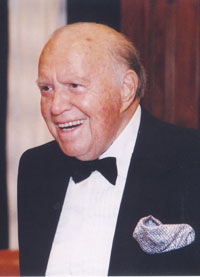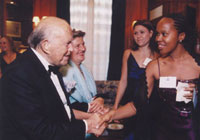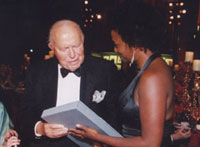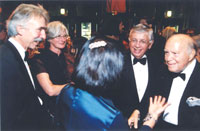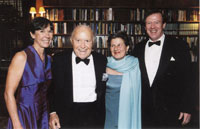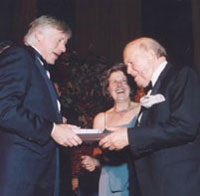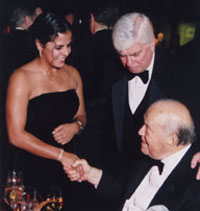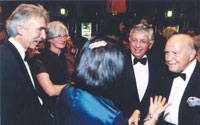|
|
 |
 |
 |
 |
|
COVER STORYOpening the GatesJohn Kluge ’37 Invests in the Future With the Kluge Scholars ProgramBy Shira Boss-Bicak ’93
|
|||||||||||||||||||||||||||||||||||||||||||||||||||||||||||||||||||||||||||||||
|
|
|
|
The Kluge Scholars Program has opened Columbia’s gates to hundreds of promising students and enriched their College experiences. Cynthia Young ’91 is just one of the many who have benefited from the generosity of John Kluge ’37.
“If I had not received a Kluge scholarship, I would have been just another Cleveland kid working full time and going to community college,” says Young, who graduated magna cum laude and is an assistant professor of English and American studies and ethnicity at the University of Southern California. “[Kluge’s] willingness to invest in human potential, that commitment to leveling the economic and racial playing field, helped me reach my goals and lies at the very core of who I am as an activist, teacher and researcher.”
On October 1, the University celebrated Kluge’s 90th birthday with a black-tie dinner. Kluge, a German immigrant and College scholarship recipient, became one of America’s most successful entrepreneurs and a generous philanthropist. His multi-million dollar gifts have endowed the Kluge Scholars Program at the College, which supports intercultural and international student populations.
“Columbia College has for decades functioned as a social escalator for young people whose ability to learn is not matched by their ability to pay the cost of such learning,” notes Dean Austin Quigley. “It says a lot about John that, when he decided to give back to Columbia, he chose to strengthen and support this aspect of its tradition. As he will always point out, the diversity of the student body at Columbia is a resource for all of our students, as they learn together not only from and with the faculty, but also from and with each other. For John, the best investments we make in life are our investments in other people, and through this program, he has invested extensive resources in the young people of today and in the intellectual, intercultural and international leaders of tomorrow.”
|
|
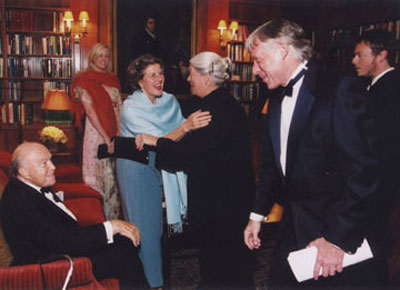 |
| President Lee C. Bollinger
and his wife, Jean Magnano Bollinger, welcome John Kluge '37;
his wife, Tussi; his son, John Jr. '05; and John Jr.'s guest,
Anne Rawlings. |
The Kluge Scholars Program started in 1987, the 50th anniversary of Kluge’s graduation from the College, during the presidency of Michael Sovern ’53. The four-year scholarships, which now extend to some 50 individuals in each class, provide financial support along with extensive programming aimed at promoting intellectual growth, leadership development and global awareness.
“If I can help disadvantaged students to experience the sense of a common enterprise and shared dreams that I knew as an undergraduate, then everything we accomplish will be even more worthwhile,” Kluge said at a University convocation shortly after the program was founded.
Students in the program are selected from underrepresented populations and are deemed by admissions officers as most able to benefit from being part of the Scholars community and who will, in turn, contribute significantly to the collective experience of Columbia students.
|
|
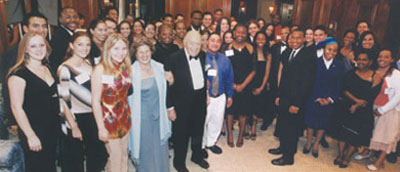 |
| Kluge and his wife,
Tussi, join current Kluge Scholars at a reception at the President's
House prior to the gala dinner. |
“The ideal candidate is someone who is going to take Columbia by storm in many ways, and who will bring a different perspective and special voice … someone who will be active in the community and a leader on campus,” says Jessica Marinaccio, director of undergraduate admissions.
Imo Nse Imeh ’02, the son of Nigerian immigrants, performs in a gospel choir, has exhibited his paintings and drawings in galleries and sold them to collectors and worked with curators at the Metropolitan Museum of Art on an exhibition of 1929–45 African-American art. He is pursuing a doctorate in art history at Yale. Another former Kluge Scholar, Ben Jealous ’97, became a Rhodes Scholar and is director of the U.S. Domestic Human Rights program at Amnesty International USA.
Without receiving a Kluge Scholarship, says Sheila Dvorak ’03, “I would not have been able to attend Columbia, and I would have been trapped in the cycle of poor begets poor that affects so many of the disadvantaged in our society.” Dvorak directed the 109th Varsity Show and other campus productions and since graduation has co-founded a Brooklyn theater company.
“Our goal is to recruit and attract outstanding students from across the nation and around the world,” says Marinaccio, “and having the Kluge program to honor and support such students allows us to do that at an even higher level.”
|
|
|
|
| Kluge Scholars Monique
Alves '07 (foreground) and Kimberly Ramos '06 meet their benefactor
at the pre-dinner reception. |
|
|
| Kluge accepts a book
of remembrances from Mignon Moore '92, a former Kluge Scholar
who now is an assistant professor at Columbia. |
|
|
| Bollinger chats with
two former Kluge Scholars who have earned Ph.D.s, Kimberley
Johnson '89 (left) and Ayanna Thompson '94. |
|
|
| Kluge and his wife,
Tussi, are flanked by Dean Austin Quigley and his wife, Patricia
Denison. |
|
|
| Bollinger presents Kluge
with the Alumni Federation Medal as Kluge's wife, Tussi, beams. |
|
|
| Kluge shakes hands with
a Kluge Scholar as Sen. Christopher Dodd (D.-Conn.) looks
on. |
|
|
| Kluge visits with (from
left) V.P. of Arts & Sciences Nicholas Dirks; College Associate
Dean of Administration Susan Mescher; Dirks' wife, assistant
professor Janaki Bakhle; and Chairman of the Board of Trustees
David Stern. |
Denise De Las Nueces ’03 was class salutatorian and attends Harvard Medical School. She recalls, “I entered Columbia armed with the comforting knowledge that I could dedicate my time not to worrying about paying for college expenses, but rather to tackling my academics and broadening my experience through extracurricular activities.”
During their four years on campus, Kluge Scholars belong to a community that shares social, cultural and academic opportunities. Each semester, in addition to cultural outings and off-campus events with faculty or other guests, five major events are arranged around a theme. The fall semester theme is “America on the World Stage,” and includes speakers and discussion groups about the changing media, the origins of AIDS in Africa and America’s recovery from 9-11. These events also are open to members of the John Jay, C.P. Davis and Global scholar programs.
“It’s more than community; we’re trying to develop leaders,” says Lavinia Lorch, assistant dean and head of the Scholars and Fellowships office. “What we try to instill in [the students] complements their academic experience and dorm life. It’s a leadership development program.” Often, meeting guests at events leads to internships for the students, which can otherwise be difficult for first-year students to attain, Lorch noted.
During their first year, the Scholars participate in the Kluge Columbia Journey program. A groups of about 20 students is assigned to a graduate student mentor and, once a month, they attend a Columbia cultural or intellectual event together and discuss its importance and implications. Mentoring is a key to leadership development in the program and enables students to meet other leaders and understand the reciprocal relationship between receiving and giving personal and professional support.
“As a Kluge Scholar, I have participated in intellectual discourse with people renowned in their fields, from academic scholars to CEOs to presidents of countries, and I am learning my civic duty as an educated person within the society around me,” wrote Monique Alves ’07 in a thank-you note to Kluge. “I can only hope to live up to and beyond that duty as you have in your generosity toward so many students.”
Another component of the program is internship opportunities. Last year, the Kluge Scholars program began to offer Kluge School-Based Mental Health Internships. Designed by Dr. Owen Lewis, a professor in Columbia’s medical school’s child and adolescent psychiatry department, and Paulina Loo, the director of psychiatric services in three public schools in Washington Heights, the program combines field work with academic study in mental health. The paid interns attend a weekly seminar taught by Lewis and work for two hours each week with a challenged public school student, meeting with parents, teachers and clinicians involved.
“[Dr. Lewis] treats them like medical students and invites outside speakers,” Lorch says. “The program was so successful and exciting that it has changed the career plans of a number of students.” Some students who participated last year have asked to continue this year as volunteers. Internship and outreach opportunities also include participation in the University’s Double Discovery Center, in which students tutor inner city high school students, and visits to the Library of Congress to participate in ventures such as the digital library project.
Kluge’s generosity also has expanded career horizons for students through grants for summer research projects. Open to all students in underrepresented populations at the College, not only to Kluge Scholars, the program funds independent research projects conducted with faculty sponsorship. These projects provide opportunities for travel, supervised research and writing.
“Many of those who have gone on for Ph.D.s started with a research project,” noted Associate Dean of Administration Susan Mescher. This summer, students conducted research at locations across the United States as well as in Cuba, Ethiopia and Brazil.
The summer research program also is a way for undergraduate students to get a taste of what doctoral study and a career in academia may be like. A disproportionately low number of minority students nationwide earn doctoral degrees and become professors, and Kluge believes one way to help remedy that imbalance is to provide additional support and encouragement to those interested in pursuing such a career. More than a dozen Kluge students have gone on to faculty positions at American universities, including Columbia.
“The reason I’m doing it is that, as an immigrant, you are a minority,” Kluge says. “If minorities get the proper tools, they’ll do as well as anybody else.”
For students interested in academic careers, the Kluge program support extends beyond the undergraduate years. Those who complete doctorate degrees can have their undergraduate loans reduced through the Kluge Loan Forgiveness program.
“It is difficult for many students to think outside the box of traditional careers, and particularly so for minority students, who may be of the first generation in their families to attend college or who may not have a family history or background in academia,” says Leslie Harris ’88, a former Kluge Scholar who earned a Ph.D. from Stanford in 1999 and teaches at Emory University.
Ayanna Thompson ’94 describes how her perception of academia and her potential career in it was changed by the Kluge program: “I was aware of the lack of women of color teaching the literature courses I so much enjoyed. … I was not convinced that this was a field that was open to women of color. … It was not until I learned of the Kluge program that I realized someone else believed that young people of color might want to pursue jobs in the academy.” Thompson earned a Ph.D. from Harvard in 2001 and teaches at the University of Arizona.
“To me, philanthropy comes naturally because I know that when you pass out of this picture, you don’t take anything with you,” Kluge says. “With the sands of time, we make very little difference, but what difference we can make we should try to make.”
Contributing writer Shira Boss-Bicak ’93
is a New York City-
based freelance journalist.
| || | || |
CCT Home |
|
|
CCT Masthead |
